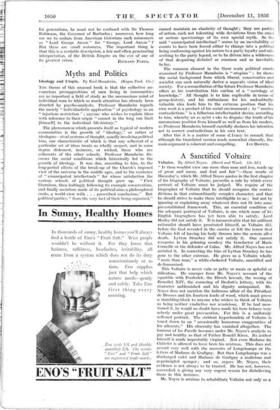A Sanctified Voltaire
Voltaire. By Alfred Noyes. (Shoed and Ward. 12s. 6d.)
"IF thou wouldst view one more than man' and less, made up of great and mean, and foul and fair "—these words of Macaulay's, which Mr. Alfred Noyes quotes in the first chapter
of his biography of Voltaire, prescribe a rule by which every portrait of Voltaire must be judged. We reqUire of the biographer of Voltaire that he should recognise the contra- dictions in that extraordinarily complex character, and that he should strive to make them intelligible t6 us ; but not by ignoring or explaining away whatever does not fit into some pre-established framework. This, an essential condition of the adequate portrayal of Voltaire, is one which none of hi; English biographers has yet been able to satisfy. Lord Morley did not satisfy it. It is inconceivable that his militant rationalist should have prostrated himself, as Voltaire did, before the God revealed in the sunrise or felt the terror that Voltaire felt of having his body thrown into the sewers after death. Lytton Strachey did not satisfy it. One cannot recognise in his grinning monkey the benefactor of Marie Corneille or the defender of Calas. Mr. Alfred Noyes has not satisfied it. In correcting the bias of Lytton Strachey he has gone to the other extreme. He gives' us' a Voltaire wholly "more than man," a white-chokered Voltaire, sanctified and de-humanised.
This Voltaire is never vain or petty or mean or spiteful or ridiculous. He emerges from Mr. Noyes's account of the squabble with Frederick, the Hirsch lawsuit, the wooing of Benedict XIV, the cornering of Desfort's lottery, with his character unblemished and his dignity unimpaired. Mr. Noyes does not mention the ludicrous affair of the President de Brosses and his fourteen loads of wood, which must prove a stumbling-block to anyone who wishes to think of Voltaire as being neither vindictive nor avaricious. If he had men- tioned it, he would no doubt have made his hero behave very soberly under -great provocation. For this 'is a uniformly softened portrait. The strident hypochondria of Voltaire is toned down to an "occasionally humorous exaggeration of his ailments." His obscenity has vanished altogether. The humour of La Pueelle becomes under Mr. Noyes's analysis as gay and healthy as that of Father Ronald Knox. Its author himself is made improbably virginal. Not even Madame du Chatelet is allowed to have been his mistress. This does not accord very well with the memoirs of Longehamps or the laters of Madame de Grafigny. But then Longchamps was a discharged valet and Madame de Grafigny a malicious and unprincipled sponger ; and so, argues Mr. Noyes, their evidence is not always to be trusted. He has not, however, succeededi it giving any very cogent reason for disbelieving them in this instance.
Mr. Noyes is anxious to rehabilitate Voltaire not only as a
man but also as a writer. He is able to admire the tragedies in which Lytton Strachey could see only "a procession of pompous commonplaces." I agree that this condemnation is far too summary. It can, I think, reasonably be argued that Voltaire had a good sense of the theatre. Perhaps a per- formance of Brutus or Merope could still be made moving. But not every play that ean be made moving on the stage is a literary masterpiece ; and Voltaire's surely are not. Their plots, except when he is drawing on a classical model, are crudely melodramatic. They contain, so far as I can see, no outstanding feats of characterisation. And the style in which they are written tends to make the worst of two worlds. It has neither the naturalness which is required in the modern theatre nor the majesty and beauty for which we value Racine. If it was Mr. Noyes's intention to make us look upon Voltaire as a great writer he would have been -wise, I suggest, to devote less space to the tragedies and more to the letters and prose stories. For it is as a writer of prose and not, in spite of one or two charming lyrics, as a poet or a dramatist that Voltaire holds his place in the history of literature.
The admiration which Mr. Noyes feels for Voltaire does not extend to the other philosopher. He is particularly contemptuous of D'Alembert, whom he accuses of having a "quick, shallow and sometimes repulsively leering mind." Yet the contributions of D'Alembert to the theory of pro- bability are far more acute and original than anything that is to be found in the philosophical writings of Voltaire. What prevents Mr. Noyes from doing justice to D'Alembert is the fact that "he had never felt the faintest stirrings of any kind of religion." Voltaire, on the other hand, is regarded by Mr. Noyes as having been a profoundly religious man.
How much truth is there in this characterisation of Voltaire ? It is c:ear enough that he was not an atheist. Like other pre-Kantian philosophers, he accepted the argu- ment from design. He Eftw no fallacy in assuming that it was valid to speak of the world as of a house which pre-supposed an architect. We may allow also that he felt at least an intermittent impulse to worship the God of whose existence he was intellectually convinced. Whether he believed in a personaland benevolent God is more doubtful. The most that can fairly be said, I think, is that he felt that such a-God Was required to redress the balance of evil in the world over good, and that, With his k/..eat sense of justice, he could not bear the thought that it might after all go unredressed. I agree with Mr. Noyes in regarding the lines in the poem on the Lisbon earthquake Un jour, tout sera bien, voiles noire esperance ; Tout en t bien aujourd'hui, voila r illusion as truly expressive of Voltaire's attitude. But it Must be stressed that this religious optimism was in him no more than a hcipe. As for the divinity of Christ, the evidence is markedly against his having believed in it. I cannot sum up his attitude on this point better than- he ilOes- himself. Dieu. puissant ! Je erois ! Quiirit a Monsieur le Fits, et a Madame sa flare, c'est tare autre affalrE.- Mr. Noyes's book is very long but it is nearly always interesting. Whatever else may be said against it, it is not a shallow work. - I have given reasons for thinking that it gives only a one-sided and, to some extent, distorted picture Of Voltaire. But it remains a contribution to an exceedingly complex subject, of which subsequent biographers

















































 Previous page
Previous page